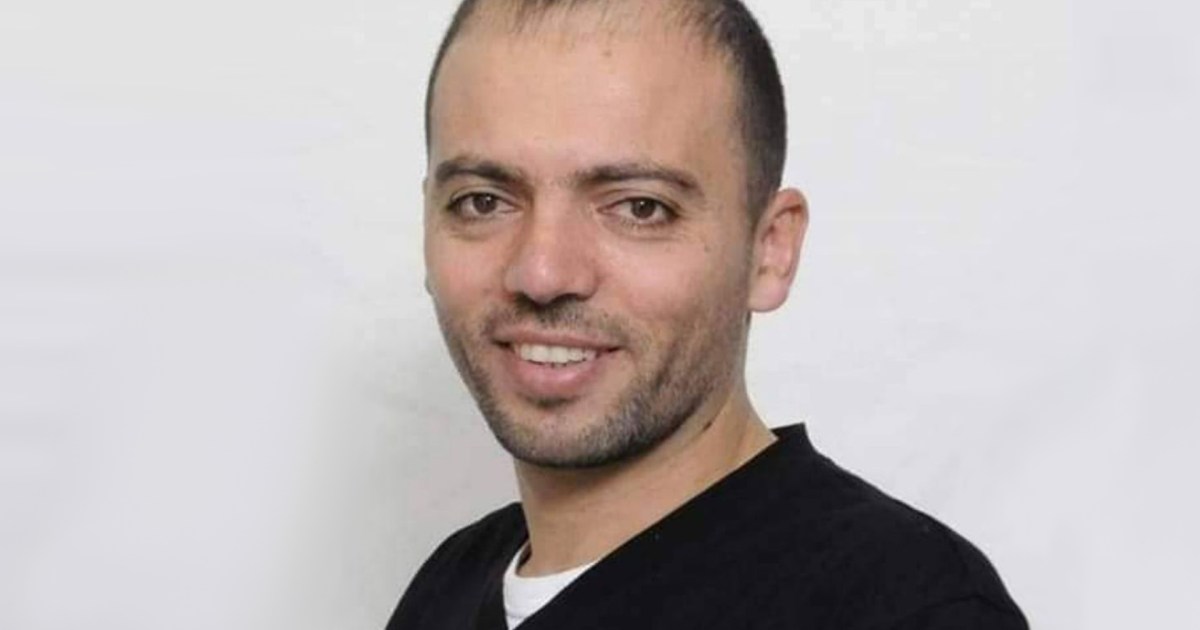Bethlehem
- Palestinian prisoner Khalil Muhammad Awawda from the town of Idna, west of Hebron in the southern occupied West Bank, distributed sweets to his fellow prisoners in the Ofer prison near Ramallah, days before the start of a hunger strike against administrative detention on the third of March 2022.
One of the prisoners in the "Ofer" military prison says that Awawda distributed sweets to the prisoners because he was confident of his victory in the battle of the empty intestines he fought to gain his freedom, despite the boycott of the administrative prisoners in the Israeli occupation prisons for military courts for more than 115 days.
Awawda, who is 40 years old - a father of 4 daughters - spent more than 12 years in the occupation prisons in 5 arrests, 3 of which were administrative sentences.
For the 51st day in a row, the prisoner Khalil Awawda (40 years), from the town of Idna, west of Hebron, continues his hunger strike, in refusal to be administratively detained in the occupation prisons.# Palestine pic.twitter.com/Ox9oxW0aqx
— Quds Network |
Prisoners (@asranews) April 22, 2022
Shortening the length of detention
He was last arrested on December 27, 2021, on charges of incitement, before the charge was dropped on January 5, 2022, which prompted the occupation authority to transfer him to administrative detention, that is, without charge, for a renewable period of 6 months.
Awawda decided to go on a hunger strike, according to his wife, Dalal, because he knew that the last two administrative detentions had passed only during his two years in detention.
His wife, Dalal Awawda, says to Al Jazeera Net that Khalil has gone on strike 6 times previously, and all of them were in collective strikes for prisoners, and this is the first time that he went on an individual hunger strike.
The occupation took a long time before transferring him to a medical clinic, and after he spent 36 days on hunger strike inside the cells of Ofer Military Detention Center, he was transferred to the detention center of Ramle prison clinic, and during this period he did not change his clothes and did not provide him with any of his daily needs, to pressure him to force him to stop his strike.
Exhausted body and confidence in victory
Today, he cannot stand on his feet, and suffers from aches in his hips and bones, and his stomach can no longer absorb water, and he is excreting water and blood, forcing him to receive water without salts or intravenous supports, fearing that his body will reach severe dehydration.
Although he is in a difficult health condition and has difficulty speaking, last Tuesday he was able to deliver a message to his family and lovers through the lawyer who visited him, that he will continue to go on hunger strike until he is freed, and he is in high spirits and determination confident in victory, and activists described his strike as the fasting who It does not break.
Awawda has not yet graduated from Al-Quds Open University, where he is studying to obtain a bachelor’s degree, because of his repeated arrests while he was in the last semester of the university.
The Israeli occupation arrests about 600 administrative prisoners in its prisons, without clear charges, which prompted them to boycott the military courts of the occupation 115 days ago, but without any relief from administrative detention.
Toleen, Lauren, Maria, Maryam, sons of Khalil Awawda The striker from 49 days # Freedom_for_Khalil_Awadeh pic.twitter.com/r0AMMxrSaI
- The prisoner is not a number (@Freethemall6) April 20, 2022
Stealing the ages of the Palestinians
Amani Farahneh of the Palestinian Prisoner Club says that this number is very high, and that the year 2022 is considered one of the highest in transferring to administrative detention, and nearly 200 cases of administrative detention have been counted per month since the beginning of the year, except that many of the targets have not experienced detention before or They have not been administratively detained before.
In her speech to Al Jazeera Net, Fararneh believes that the aim of the administrative arrests is to undermine any confrontation or advancement at the popular and political level, and active people in their community are targeted, and Khalil Awawda is one of them, in addition to the presence of crimes committed against administrative prisoners, considering this to be a theft of the lives of the Palestinian people. .
Among these crimes, which Farajneh described as dirty, is the bargaining of the 80-year-old prisoner, Bashir Al-Khair, to confess to a specific case in exchange for transferring his file from administrative detention, and its aim is to force the prisoner to confess to something he does not want to stop his administrative detention.
There are also two female prisoners in administrative detention, according to Farajneh. They are Bushra al-Taweel, whose father went on a hunger strike to stop her administrative detention, and the occupation re-arrested her and ruled her administratively.
Likewise, Shurooq Al-Badan, who is a mother of a child, has been administratively detained since 2019. Despite her release, she was re-arrested administratively.
Among the administratively detained cases are the prisoner Abdel Baset Maatan, who has cancer, and the captive Raed Rayan, 28 years old, from the town of Beit Duqo, near Ramallah, who has been on hunger strike against administrative detention for 17 days, after he was subjected to many abusive measures inside the prison.
Farajneh says that the boycott of the administrative prisoners of the occupation courts aims to not recognize these military courts, and this boycott needs a long time to have results, considering it the first step that the administrative prisoners have taken, and that there are other steps that will be after the Eid under study by them, including The collective hunger strike, or the return of individual strikes to the fore again, to try to break the administrative detention.

